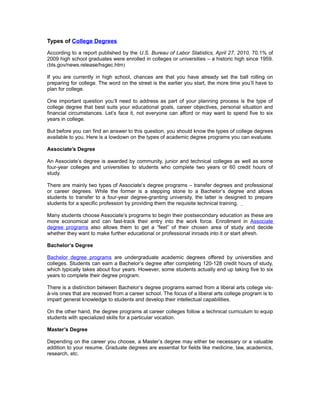
Types of College Degrees Explained
- 1. Types of College Degrees According to a report published by the U.S. Bureau of Labor Statistics, April 27, 2010, 70.1% of 2009 high school graduates were enrolled in colleges or universities – a historic high since 1959. (bls.gov/news.release/hsgec.htm) If you are currently in high school, chances are that you have already set the ball rolling on preparing for college. The word on the street is the earlier you start, the more time you’ll have to plan for college. One important question you’ll need to address as part of your planning process is the type of college degree that best suits your educational goals, career objectives, personal situation and financial circumstances. Let’s face it, not everyone can afford or may want to spend five to six years in college. But before you can find an answer to this question, you should know the types of college degrees available to you. Here is a lowdown on the types of academic degree programs you can evaluate. Associate’s Degree An Associate’s degree is awarded by community, junior and technical colleges as well as some four-year colleges and universities to students who complete two years or 60 credit hours of study. There are mainly two types of Associate’s degree programs – transfer degrees and professional or career degrees. While the former is a stepping stone to a Bachelor’s degree and allows students to transfer to a four-year degree-granting university, the latter is designed to prepare students for a specific profession by providing them the requisite technical training. Many students choose Associate’s programs to begin their postsecondary education as these are more economical and can fast-track their entry into the work force. Enrollment in Associate degree programs also allows them to get a “feel” of their chosen area of study and decide whether they want to make further educational or professional inroads into it or start afresh. Bachelor’s Degree Bachelor degree programs are undergraduate academic degrees offered by universities and colleges. Students can earn a Bachelor’s degree after completing 120-128 credit hours of study, which typically takes about four years. However, some students actually end up taking five to six years to complete their degree program. There is a distinction between Bachelor’s degree programs earned from a liberal arts college vis- à-vis ones that are received from a career school. The focus of a liberal arts college program is to impart general knowledge to students and develop their intellectual capabilities. On the other hand, the degree programs at career colleges follow a technical curriculum to equip students with specialized skills for a particular vocation. Master’s Degree Depending on the career you choose, a Master’s degree may either be necessary or a valuable addition to your resume. Graduate degrees are essential for fields like medicine, law, academics, research, etc.
- 2. For a lot of professions, however, you can settle with a Bachelor’s degree, wait for a few years before you return to school for a graduate degree or decide to continue on the path of education and gain mastery over your chosen field straight after completing undergraduate study. Remember that a Master’s degree involves two to three additional years of school, intensive coursework, and writing a thesis paper at the end of it. In fact, some Master’s degree programs may have prior work experience as one of the qualifying criteria since they need a higher level of analysis and professional application by students. Doctoral Degree A doctoral degree is the highest level of post secondary degree one can receive. For a student to earn a doctorate, he or she needs to complete original research on a subject of his/her choice and publish a thesis or research paper. The completion of this degree leads to the title of “Doctor” being conferred to students, denoting their absolute authority over the subject of their doctorate. Needless to say, a doctoral degree can only be pursued after the successful completion of a Master’s program and can make a significant impact on your paycheck!